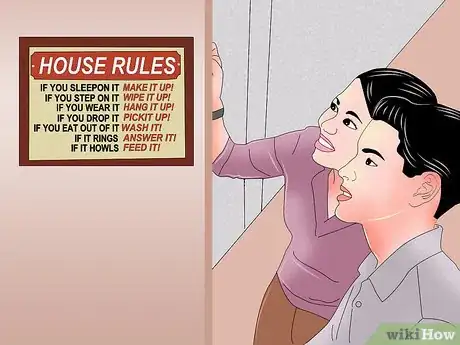This article was co-authored by Supatra Tovar, PsyD, RD. Dr. Supatra Tovar is a Licensed Clinical Psychologist (PSY #31949), Registered Dietitian, Fitness Expert, and the Owner of Dr. Supatra Tovar and Associates. Dr. Tovar has worked in the fields of health education, clinical dietetics, and psychology. With over 25 years of holistic wellness experience, she practices Holistic Health Psychotherapy. She combines her psychology, diet, and fitness knowledge to help those struggling with depression, weight gain, eating disorders, life transitions, and relationships. Dr. Tovar holds a BA in Environmental Biology from The University of Colorado Boulder, an MS in Nutrition Science from California State University, Los Angeles, and a PsyD in Clinical Health Psychology from Alliant International University, Los Angeles.
There are 11 references cited in this article, which can be found at the bottom of the page.
This article has been viewed 72,436 times.
Just because you don't have a paying job does not mean that you don't need some spending money. As a kid, there are many things that you can imagine buying if only you had some cash. Many parents give their children an allowance. An allowance is an ideal way for you to have a little financial independence. It is also a great way to demonstrate to your parents that you are responsible enough to handle money. There are several steps you can take when asking your parents for an allowance.
Steps
Preparing Your Case
-
1Do some research. If you are reading this, then you are old enough to receive an allowance. Good news! Experts report that it is useful to start teaching children about financial responsibility as early as kindergarten. Studies show that kids who earn an allowance better understand the value of hard work.[1]
- An allowance also teaches independence. When a child has their own money, they feel more in control of choices, such as what to spend that money on. For example, explain to your parents that you will be able to purchase your own video games, with their permission, of course.
- Gather some information, such as average allowance amounts, and how often most parents give their kids a set allowance. Most kids receive an allowance each week. Try asking your parents for a dollar for each year you have been alive. For example, if you are 10 years old, you would get $10 a week.
- Ask your friends and classmates if they receive an allowance, and if so, how much. You can use this information when you make your case to your parents.
-
2Prepare a budget. Your parents will be more likely to listen if you can clearly explain why you need an allowance. Make a list of the things that you are likely to spend money on. Find out how much those items cost. This will give you a good idea of a specific amount of money to request from your parents.
- If you are new to making a budget, there are tools that you can use to help you. Look for free apps that you can put on your phone, or online programs that you can use. After you successfully receive your allowance, these tools can also help you keep track of your spending.[2]
- When you are listing budget items, make sure that you set aside some money for savings. Whether you intend to use your savings for a new bike or for college, your parents will appreciate that you are thinking ahead.[3]
Advertisement -
3List the benefits. Giving kids an allowance is a great way to teach kids financial responsibility. This is one of the key points that you should make when you are asking your parents for an allowance. There are also many other positive points that you can add to your request. Make a list of them as you prepare so that you don't forget any.[4]
- Point out that financial responsibility leads to overall responsibility. When you learn to be in charge of one area of your life (such as buying your own video games), it is only natural that you will start to take on additional responsibilities.
- Allowances can be used to teach social responsibility. Consider telling your parents that you would like to set aside a small portion of your allowance to give to charity. For example, if you love dogs, you could make small donations to your local animal shelter.[5]
- If you have an allowance, you won't have to ask your parents every time you want something. This could be seen as a major benefit for both you and your folks!
Demonstrating Your Responsibility
-
1Do your chores. If you are old enough to receive an allowance, then you probably have some role in helping out around the house. Whether you have a set list of chores to do, or you are just expected to pitch in when asked, make sure that you are completing all of your tasks. When you are getting ready to ask for an allowance, you want to show your parents that you know how to act responsibly.[6]
- Go the extra mile. For example, if your job is to put away your clean laundry, offer to put away your little brother's clothes, too. Your parents will definitely notice and appreciate the extra effort.
-
2Obey the rules of the house. Every kid has certain rules that they are expected to follow. If you willingly follow your parents rules, this shows them that you are responsible and trustworthy. Make sure to consistently meet your parents' expectations. If they trust you to follow their rules, they will be more likely to trust you with money.[7]
- Make sure that you not only follow the rules, but that you do it without complaint. For example, if you are told to complete your homework before hanging out with your friends, do it without grumbling.
-
3Volunteer. Finding a way to volunteer is a great way to show your parents that you are giving back. This will demonstrate to them that you deserve an allowance. There are lots of volunteer opportunities for kids, no matter what your age. You could help out at a food bank, or pet the animals at your local shelter. If you choose an activity that matters to you, you'll even start to have fun.[8]
- You can also volunteer within your own family. For example, offer to spend some extra time with your grandmother. Help her out around the house. This will show your parents that you are a caring person.
-
4Show maturity. Being mature means that you are acting in a reasonable, responsible way. If you show your parents that you are growing up, they will be more likely to see you as someone who deserves an allowance. There are many ways that you can demonstrate maturity.[9]
- Be honest. Always tell your parents the truth. This will show them that they can trust you.
- Stay calm. Avoid throwing fits or whining if you don't get your way. Instead, remain calm and talk to your parents about your frustrations.
Communicating Effectively
-
1Be prepared. Make sure to plan the conversation that you want to have with your parents. Preparation will help you to stay organized and demonstrate that you take this talk seriously. Now is the time to gather your research, your budget, and your list of benefits. Make sure to have them with you when you talk to your parents.[10]
- Try making an outline of the points you want to bring up. Don't be afraid to rely on your notes as you speak. Again, this will just show your parents that you are being thorough.
-
2Pay attention to timing. Make sure that you catch your mom or dad at a good time. Don't interrupt if they are busy with something else. It is also a good idea to avoid trying to have this conversation as they are leaving for work, or just arriving home.[11]
- Try starting the conversation by asking, "Is this a good time to talk?". If the answer is no, ask when you can have an important conversation.
-
3Choose your words carefully. Make sure to be clear and direct. You want your parents to know what you are asking for, and why. Be specific, and include details. Give yourself time to make your case, and give your parents time to consider your request.
- Avoid making demands. For example, don't tell your parents that they "have" to give you an allowance. Even if your parents say no to your request, being polite and understanding will go a very long way should you ask again or ask for something else.
- Try to use "I" statements. This method of communication will convey that you are responsible and mature. For example, say "I have been doing my chores, and I feel that I am earning an allowance." This is more effective than "You need to give me an allowance."
-
4Be respectful. Everyone wants to be treated with respect, including your parents. Speak to them in a friendly, reasonable tone of voice. Remember, they're people, too! Acknowledge that you appreciate their time. Thank them for taking the time to listen to you.
-
5Listen to your parents. Being an active listener is an important part of communication. Give your parents a chance to ask questions, and carefully consider what they are saying. When they give you an answer to your questions, listen to what they are saying and try to understand their reasoning.
Expert Q&A
-
QuestionHow do I convince my mom to give me an allowance?
 Supatra Tovar, PsyD, RDDr. Supatra Tovar is a Licensed Clinical Psychologist (PSY #31949), Registered Dietitian, Fitness Expert, and the Owner of Dr. Supatra Tovar and Associates. Dr. Tovar has worked in the fields of health education, clinical dietetics, and psychology. With over 25 years of holistic wellness experience, she practices Holistic Health Psychotherapy. She combines her psychology, diet, and fitness knowledge to help those struggling with depression, weight gain, eating disorders, life transitions, and relationships. Dr. Tovar holds a BA in Environmental Biology from The University of Colorado Boulder, an MS in Nutrition Science from California State University, Los Angeles, and a PsyD in Clinical Health Psychology from Alliant International University, Los Angeles.
Supatra Tovar, PsyD, RDDr. Supatra Tovar is a Licensed Clinical Psychologist (PSY #31949), Registered Dietitian, Fitness Expert, and the Owner of Dr. Supatra Tovar and Associates. Dr. Tovar has worked in the fields of health education, clinical dietetics, and psychology. With over 25 years of holistic wellness experience, she practices Holistic Health Psychotherapy. She combines her psychology, diet, and fitness knowledge to help those struggling with depression, weight gain, eating disorders, life transitions, and relationships. Dr. Tovar holds a BA in Environmental Biology from The University of Colorado Boulder, an MS in Nutrition Science from California State University, Los Angeles, and a PsyD in Clinical Health Psychology from Alliant International University, Los Angeles.
Licensed Clinical Psychologist (PSY #31949) Give thanks! Telling your parents how much you appreciate them is one great way of opening the conversation. Obviously, make sure this is not the very first compliment you have ever given them, or they will surely suspect your motives! When the opportunity comes, state your needs openly and directly. Tell them exactly what you need!
Give thanks! Telling your parents how much you appreciate them is one great way of opening the conversation. Obviously, make sure this is not the very first compliment you have ever given them, or they will surely suspect your motives! When the opportunity comes, state your needs openly and directly. Tell them exactly what you need!
References
- ↑ http://money.usnews.com/money/personal-finance/articles/2013/07/29/should-you-give-your-child-an-allowance
- ↑ http://www.themint.org/kids/
- ↑ https://kids.usa.gov/money/saving-money/index.shtml
- ↑ http://money.cnn.com/pf/money-essentials-kids-financial-responsibility/
- ↑ http://kidshealth.org/parent/positive/family/allowance.html#
- ↑ http://www.huffingtonpost.com/hanaan-rosenthal/advice-for-teens_b_2037523.html
- ↑ http://www.rookiemag.com/2015/03/how-to-gain-your-parents-trust/
- ↑ http://pbskids.org/itsmylife/emotions/volunteering/article2.html
- ↑ http://allwomenstalk.com/10-ways-to-show-your-parents-you-are-responsible













-Step-18-Version-7.webp)



-Step-17-Version-2.webp)
-Step-16.webp)
-Step-12.webp)
-Step-16-Version-2.webp)
-Step-12-Version-3.webp)


-Step-20.webp)
-Step-18.webp)











-Step-18-Version-7.webp)




































